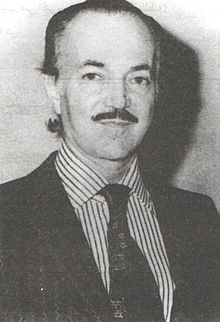Amir Khosrow Afshar
Amir Khosrow Afshar | |
|---|---|
 | |
| Minister of Foreign Affairs | |
| In office 27 August 1978 – 5 January 1979 | |
| Monarch | Mohammad Reza Pahlavi |
| Prime Minister | |
| Preceded by | Abbas Ali Khalatbari |
| Succeeded by | Ahmad Mirfendereski |
| Personal details | |
| Born | 1919 Tehran, Qajar Iran |
| Died | 1999 (aged 79–80) |
Amir Khosrow Afshar (1919–1999; Persian: امیرخسرو افشار قاسملو) was an Iranian diplomat who served as the minister of foreign affairs of Iran during the Pahlavi era from 1978 to 1979.
Biography
[edit]Born in 1919 in Tehran,[1] Afshar was a career diplomat. At the beginning of the 1950s he was the political joint secretary at the foreign ministry.[2][3] He later assumed the posts of the permanent secretary at the Ministry of Foreign Affairs and deputy foreign minister.[4][5] In 1960, he was the acting minister of foreign affairs.[6]
While serving as the deputy to Ardeshir Zahedi, Iranian foreign minister, Afshar was named as the chief Iranian negotiator on the Bahrain question in 1968.[7][8] Next, he was appointed ambassador of Iran to the Court of St James's on 6 November 1969, succeeding Abbas Aram in the post.[9][10] He held this position until December 1974 when he was replaced by Mohammad Reza Amir Teymour in the post.[11][12]
Afshar also served as the ambassador of Iran to West Germany and to France.[6] He was appointed foreign minister to the cabinet led by Jafar Sharif-Emami on 27 August 1978, replacing Abbas Ali Khalatbari in the post.[13][14] He retained the post when a military government led by Gholam Reza Azhari was formed on 6 November 1978.[13][15] His term ended in January 1979, and Ahmad Mirfendereski replaced him in the post.[1][14]
In the 1960s Afshar was among the Iranian statesmen who favored Iran's close relations with the U.S. and other Western countries in order to secure the survival of the Pahlavi dynasty.[3] He left Iran before the revolution in 1979 and died in 1999.[1]
Honors
[edit]Afshar was the recipient of Honorary Knight Commander of the Most Distinguished Order of St Michael and St George[12] and a Grand Officer of the Order of Orange-Nassau.[16]
References
[edit]- ^ a b c "خسرو افشار قاسملو". rasekhoon.net (in Persian).
- ^ Hashem Hakimi (13 February 2002). "Fatemi's outburst". The Iranian. Retrieved 9 August 2013.
- ^ a b Roham Alvandi (2014). "The Shah's détente with Khrushchev: Iran's 1962 missile base pledge to the Soviet Union". Cold War History. 14 (3): 432. doi:10.1080/14682745.2014.890591. S2CID 153838957.
- ^ Roham Alvandi (2012). "Nixon, Kissinger, and the Shah: the origins of Iranian primacy in the Persian Gulf". Diplomatic History. 36 (2): 337–372. doi:10.1111/j.1467-7709.2011.01025.x.
- ^ Thomas L. Hughes (22 April 1969). "Dispute Over the Shatt al-Arab Disturbs Relations Periodically" (Intelligence report). CIA. Retrieved 25 July 2013.
- ^ a b "Afshar-Ghassemlou, Amir-Khosrow". Harvard University. Archived from the original on 12 May 2014. Retrieved 26 July 2013.
- ^ Roham Alvandi (2010). "Muhammad Reza Pahlavi and the Bahrain Question, 1968–1970". British Journal of Middle Eastern Studies. 37 (2): 167. doi:10.1080/13530191003794723. S2CID 159639635.
- ^ Brandon Friedman (2020). The End of Pax Britannica in the Persian Gulf, 1968-1971. Cham: Palgrave Macmillan. p. 68. doi:10.1007/978-3-030-56182-6. ISBN 978-3-030-56182-6. S2CID 229220016.
- ^ "State Intelligence". The London Gazette. 27 November 1969. Retrieved 7 August 2013.
- ^ John R. Hinnells (1975). Mithraic Studies: Proceedings of the First International Congress of Mithraic Studies. Manchester: Manchester University Press. p. 518. ISBN 978-0-7190-0536-7.
- ^ "Libel damages for Iran's former ambassador". The Herald. 11 May 1984. Retrieved 26 July 2013.
- ^ a b "State Intelligence" (PDF). London Gazette. 31 December 1974. Retrieved 6 August 2013.
- ^ a b "A chronology of the Iranian Revolution (1978-79)". Derkeiler. Archived from the original on 2 May 2014. Retrieved 25 July 2013.
- ^ a b Luman Ali (2018). British Diplomacy and the Iranian Revolution, 1978-1981. Cham: Palgrave Macmillan. p. 156. ISBN 978-3-319-94406-7.
- ^ Sepehr Zabir (2012). The Iranian Military in Revolution and War (RLE Iran D). London; New York: Routledge. p. 27. ISBN 978-1-136-81270-5.
- ^ Nationaal Archief, Inventory 2.02.32, File 376, Registry number 1256
External links
[edit]- 20th-century Iranian diplomats
- 20th-century Iranian politicians
- 1919 births
- 1999 deaths
- Ambassadors of Iran to West Germany
- Ambassadors of Iran to France
- Ambassadors of Iran to the United Kingdom
- Ministers of foreign affairs of Iran
- Honorary Knights Commander of the Order of St Michael and St George
- Politicians from Tehran
